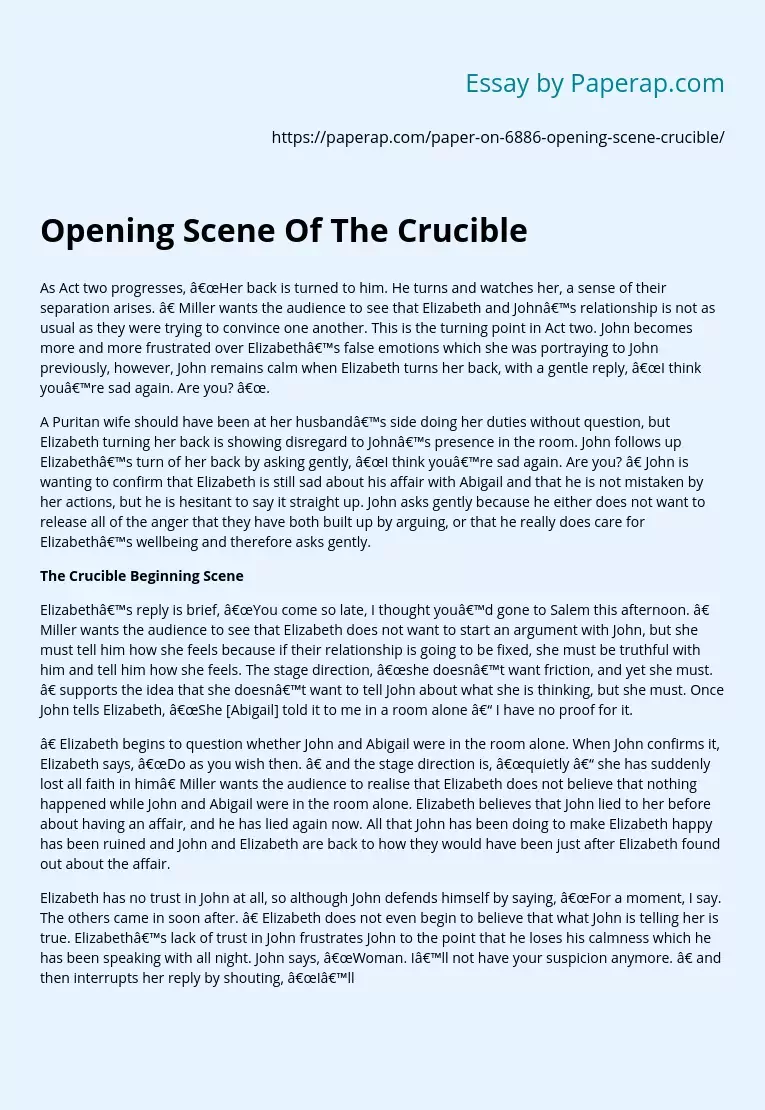Opening Scene Of The Crucible
As Act two progresses, “Her back is turned to him. He turns and watches her, a sense of their separation arises. ” Miller wants the audience to see that Elizabeth and John’s relationship is not as usual as they were trying to convince one another. This is the turning point in Act two. John becomes more and more frustrated over Elizabeth’s false emotions which she was portraying to John previously, however, John remains calm when Elizabeth turns her back, with a gentle reply, “I think you’re sad again.
Are you? “.
A Puritan wife should have been at her husband’s side doing her duties without question, but Elizabeth turning her back is showing disregard to John’s presence in the room. John follows up Elizabeth’s turn of her back by asking gently, “I think you’re sad again. Are you? ” John is wanting to confirm that Elizabeth is still sad about his affair with Abigail and that he is not mistaken by her actions, but he is hesitant to say it straight up.
John asks gently because he either does not want to release all of the anger that they have both built up by arguing, or that he really does care for Elizabeth’s wellbeing and therefore asks gently.
The Crucible Beginning Scene
Elizabeth’s reply is brief, “You come so late, I thought you’d gone to Salem this afternoon. ” Miller wants the audience to see that Elizabeth does not want to start an argument with John, but she must tell him how she feels because if their relationship is going to be fixed, she must be truthful with him and tell him how she feels.
The stage direction, “she doesn’t want friction, and yet she must. ” supports the idea that she doesn’t want to tell John about what she is thinking, but she must. Once John tells Elizabeth, “She [Abigail] told it to me in a room alone – I have no proof for it.
” Elizabeth begins to question whether John and Abigail were in the room alone. When John confirms it, Elizabeth says, “Do as you wish then. ” and the stage direction is, “quietly – she has suddenly lost all faith in him” Miller wants the audience to realise that Elizabeth does not believe that nothing happened while John and Abigail were in the room alone. Elizabeth believes that John lied to her before about having an affair, and he has lied again now. All that John has been doing to make Elizabeth happy has been ruined and John and Elizabeth are back to how they would have been just after Elizabeth found out about the affair.
Elizabeth has no trust in John at all, so although John defends himself by saying, “For a moment, I say. The others came in soon after. ” Elizabeth does not even begin to believe that what John is telling her is true. Elizabeth’s lack of trust in John frustrates John to the point that he loses his calmness which he has been speaking with all night. John says, “Woman. I’ll not have your suspicion anymore. ” and then interrupts her reply by shouting, “I’ll not have it! ” All of the tension that was building up between the two has finally exploded into anger and the friction that was avoided by both John and Elizabeth has started.
The reason John is so angry with Elizabeth’s lack of trust is because a Puritan wife should have never question anything that their husband said to them and should accept it as the truth. As the scene progresses, John begins to tell Elizabeth exactly how he feels about how she has been behaving with him. John says, “Spare me! You forgive nothin’ and forget nothin’. Learn charity, woman. ” This line has been included by Miller because it tells the audience John’s exact feelings about how Elizabeth is behaving around John. It also tells the audience some extra details about Elizabeth’s personality.
“You forgive nothin’ and you forget nothin’. ” This line tells the audience the nature of Elizabeth and one of the reasons that John is so frustrated with her. Elizabeth is not a very forgiving character and this is made more obvious as she also does not have any trust in John since the affair. John is telling Elizabeth to show him some consideration by having some trust in him when he says “spare me”. As the Act progresses, John and Elizabeth’s argument is stopped as Mary enters with a poppet for Elizabeth. John lets some of this anger out on Mary as she walks in.
When John gets mad at Mary, she tells him how she saved Elizabeth’s life, as her name was mentioned in court. Towards the end of Act four, John decides that he will confess himself, however, refuses to sign the confession that Hale produces as he does not want to tarnish his good name for his children. Danforth rejects John’s confession without him signing it, and orders for John to be hanged. Hale begs Elizabeth to change John’s mind and sign the confession, but Elizabeth claims that John wants to keep his good name, and nobody should take that.
Opening Scene Of The Crucible. (2019, Dec 05). Retrieved from https://paperap.com/paper-on-6886-opening-scene-crucible/

